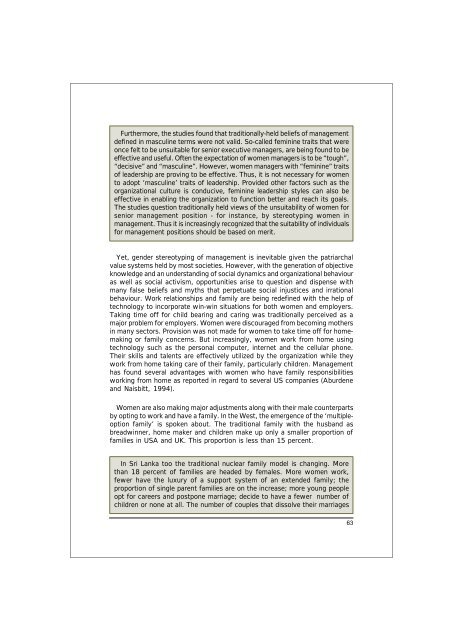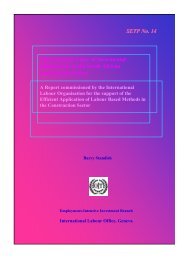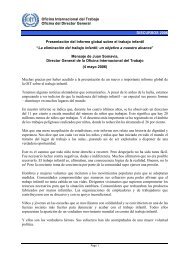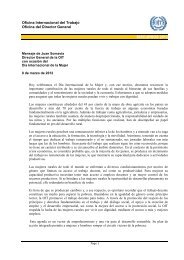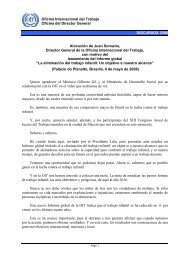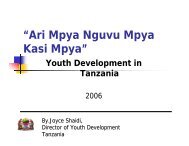Beyond Glass Ceilings and Brick Walls - International Labour ...
Beyond Glass Ceilings and Brick Walls - International Labour ...
Beyond Glass Ceilings and Brick Walls - International Labour ...
Create successful ePaper yourself
Turn your PDF publications into a flip-book with our unique Google optimized e-Paper software.
Furthermore, the studies found that traditionally-held beliefs of management<br />
defined in masculine terms were not valid. So-called feminine traits that were<br />
once felt to be unsuitable for senior executive managers, are being found to be<br />
effective <strong>and</strong> useful. Often the expectation of women managers is to be “tough”,<br />
“decisive” <strong>and</strong> “masculine”. However, women managers with “feminine” traits<br />
of leadership are proving to be effective. Thus, it is not necessary for women<br />
to adopt ‘masculine’ traits of leadership. Provided other factors such as the<br />
organizational culture is conducive, feminine leadership styles can also be<br />
effective in enabling the organization to function better <strong>and</strong> reach its goals.<br />
The studies question traditionally held views of the unsuitability of women for<br />
senior management position - for instance, by stereotyping women in<br />
management. Thus it is increasingly recognized that the suitability of individuals<br />
for management positions should be based on merit.<br />
Yet, gender stereotyping of management is inevitable given the patriarchal<br />
value systems held by most societies. However, with the generation of objective<br />
knowledge <strong>and</strong> an underst<strong>and</strong>ing of social dynamics <strong>and</strong> organizational behaviour<br />
as well as social activism, opportunities arise to question <strong>and</strong> dispense with<br />
many false beliefs <strong>and</strong> myths that perpetuate social injustices <strong>and</strong> irrational<br />
behaviour. Work relationships <strong>and</strong> family are being redefined with the help of<br />
technology to incorporate win-win situations for both women <strong>and</strong> employers.<br />
Taking time off for child bearing <strong>and</strong> caring was traditionally perceived as a<br />
major problem for employers. Women were discouraged from becoming mothers<br />
in many sectors. Provision was not made for women to take time off for homemaking<br />
or family concerns. But increasingly, women work from home using<br />
technology such as the personal computer, internet <strong>and</strong> the cellular phone.<br />
Their skills <strong>and</strong> talents are effectively utilized by the organization while they<br />
work from home taking care of their family, particularly children. Management<br />
has found several advantages with women who have family responsibilities<br />
working from home as reported in regard to several US companies (Aburdene<br />
<strong>and</strong> Naisbitt, 1994).<br />
Women are also making major adjustments along with their male counterparts<br />
by opting to work <strong>and</strong> have a family. In the West, the emergence of the ‘multipleoption<br />
family’ is spoken about. The traditional family with the husb<strong>and</strong> as<br />
breadwinner, home maker <strong>and</strong> children make up only a smaller proportion of<br />
families in USA <strong>and</strong> UK. This proportion is less than 15 percent.<br />
In Sri Lanka too the traditional nuclear family model is changing. More<br />
than 18 percent of families are headed by females. More women work,<br />
fewer have the luxury of a support system of an extended family; the<br />
proportion of single parent families are on the increase; more young people<br />
opt for careers <strong>and</strong> postpone marriage; decide to have a fewer number of<br />
children or none at all. The number of couples that dissolve their marriages<br />
63


